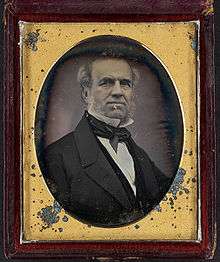James Haughton (reformer)
James Haughton (5 May 1795 – 20 February 1873), nicknamed "Vegetable" Haughton[1], was an Irish social reformer, temperance activist and vegetarian.

Life
Haughton, son of Samuel Pearson Haughton (1748–1828), by Mary, daughter of James Pim of Rushin, Queen's County (now County Laois), Ireland, was born in Carlow and educated at Ballitor, County Kildare, from 1807 to 1810, under James White, a quaker. After filling several situations to learn his business, in 1817 he settled in Dublin, where he became a corn and flour factor, in partnership with his brother William. He retired in 1850. Although educated as a Friend, he joined the Unitarians in 1834, and remained throughout his life a strong believer in their tenets.
He supported the anti-slavery movement at an early period and took an active part in it until 1838, going in that year to London as a delegate to a convention. Shortly after the Temperance campaigner, Father Mathew, took the pledge, 10 April 1838, Haughton became one of his most devoted disciples. For many years he gave most of his time and energies to promoting total abstinence and to advocating legislative restrictions on the sale of intoxicating drinks.
In December 1844 he was the chief promoter of a fund which was raised to pay some of the debts of Father Mathew and release him from prison. About 1835 he commenced a series of letters in the public press which made his name widely known. He wrote on temperance, slavery, British India, peace, capital punishment, sanitary reform, and education. His first letters were signed ‘The Son of a Water Drinker,’ but he soon commenced using his own name and continued to write till 1872. He took a leading part in a series of weekly meetings which were held in Dublin in 1840, when so numerous were the social questions discussed that a newspaper editor called the speakers the "Anti-everythingarians". In association with Daniel O'Connell, of whose character he had a very high opinion, he advocated various plans for the amelioration of the condition of Ireland and the Repeal of the Union, but was always opposed to physical force. He was one of the first members of the Statistical Society of Dublin, 1847, a founder of the Dublin Mechanics' Institute, 1849, in the same year was on the committee of the Dublin Peace Society, aided in abolishing Donnybrook Fair 1855, and took a chief part in 1861 in opening the Botanic Gardens at Glasnevin on Sundays.
He died at 35 Eccles Street, Dublin, on 20 Feb. 1873, and was buried in Mount Jerome Cemetery 24 Feb. in the presence of an immense crowd of people.
His son, Samuel Haughton published a memoir of his father's life including extracts from his public correspondence in 1877. The scientist Samuel Haughton was a half nephew of James Haughton. The scientist was the second son of yet another Samuel Haughton (1786-1874), who in turn was the son of Samuel Pearson Haughton and his second wife, Jane Boake.
Vegetarianism
Haughton became a vegetarian in 1846, both on moral and sanitary grounds.[2] For two or three years before his death he was president of the Vegetarian Society of the United Kingdom.[2]
Publications
| Wikisource has original works written by or about: James Haughton |
- Slavery Immoral, 1847
- A Memoir of Thomas Clarkson, 1847
- A Plea for Teetotalism and the Maine Liquor Law, 1855
References
- Burke's Irish Family Records (1976, pp. xxiii and 563).
- Haughton, Samuel (1877). Memoir of James Haughton: With Extracts From His Private and Published Letters. Dublin. p. 86
- Attribution
